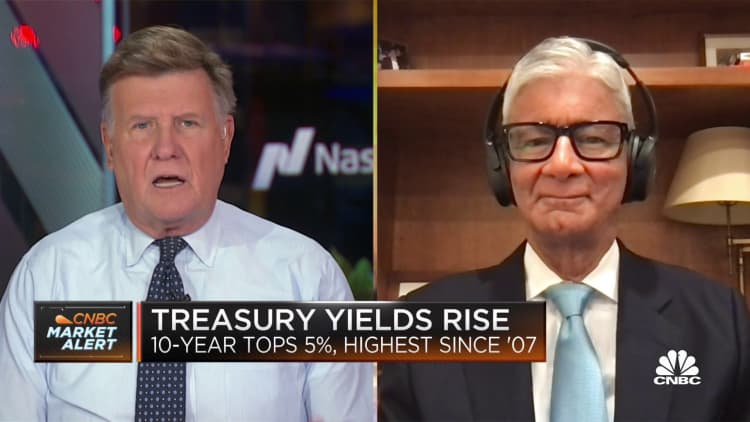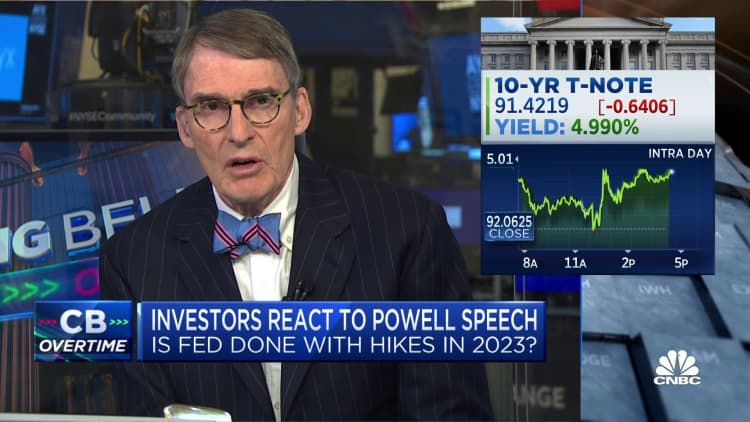The U.S. Federal Reserve Building in Washington, D.C.
Win Mcnamee | Reuters
Forecasters have been really wrong on the economy recently, but it’s nothing new: They’ve always been wrong.
I was amused yesterday to hear that JPMorgan Chase CEO Jamie Dimon was shocked — shocked! — that the economic forecasts of the major Wall Street banks had been “100 percent dead wrong” in the last 18 months. Dimon urged humility: “I would be quite cautious about what might happen next year,” he said at the Future Investment Initiative summit in Riyadh, Saudi Arabia.
He’s not the only one who seems surprised.
The New York Times also chimed in on the poor forecasting record of economists Monday in a separate story, “New Normal or No Normal? How Economists Got It Wrong for 3 Years,” which notes that economic forecasts that inflation in 2021 would be “transitory,” and that calls that 2023 would be mired in recession due to the Federal Reserve’s rate increases, have all proved to be wrong.
“The forecasts have been embarrassingly wrong, in the entire forecasting community,” Torsten Slok at the asset manager Apollo Global Management, said in the Times story. “We are still trying to figure out how this new economy works.”
You can hear the subtext: “My forecast would have been right, if it wasn’t for Ccovid!” or”I would have been right if Russia hadn’t invaded Ukraine!”
It’s all nonsense. Unfortunately, stock pickers, analysts, strategists, economists and even the Federal Reserve are no better at forecasting the “old economy” than they are the “new economy.”
It’s true that Covid and the Russian invasion of Ukraine threw off forecasts, but that’s beside the point: Wrong forecasts are the norm, not the exception. Wall Street, and everyone else, are routinely wrong, and it has nothing to do with Covid.
Why can’t anyone get the future right?
It’s been a bit of a joke in academic circles for ages: Nobody can forecast the future very well. Nobody.
Strategists and analysts are poor at predicting earnings and economic trends. Economists are terrible. Even the Federal Reserve, with the finest economists in the world, have a terrible track record of predicting even short-term trends in inflation and GDP.

And it’s not any better in any other discipline. Forecasters in general are terrible.
In a 2005 book, “Expert Political Judgment,” University of Pennsylvania professor Philip Tetlock studied the predictions of almost 300 experts in many different fields, including politics, economics, and the social sciences. It included academics, economists, and journalists.
His conclusion: “We find few signs that expertise translates into greater ability to make either ‘well-calibrated’ or ‘discriminating’ forecasts.”
How is this possible? How can everyone be so lousy at predicting the future? There are two big issues.
What’s wrong with the future?
First, forecasters are riddled with biases that limit the quality of their predictions.
Forecasters, for example, are overconfident in their ability to make predictions. They also exhibit herd behavior, blindly following what others are forecasting. Or they select information that supports their own point of view, while ignoring information that contradicts it. These and other biases skew the interpretation of the data.
Second, the future is so complicated that it is largely unknowable. Events occur that are unpredictable and affect outcomes.
It’s uncomfortable to think that we really don’t know too much about the future, but it’s true.
Think about trying to predict where the price of a stock will be one year from now. The hard-working stock analyst is tasked with figuring out what the future earnings and dividend of the company will be one year from now and how that will affect the stock price.
How hard could that be?
Turns out, very hard. Every company has millions of different variables, each of which can affect the outcome.
Some factors may be predictable, but many are not.
On the macro level, the economy may face new shocks or surprises, such as inflation, a rise in interest rates, a war that disrupts critical supplies, or a cyberattack. The company may face a new competitor. It may be bought out or engage in an unforeseen merger.
And that’s not even considering a gigantic outlier like Covid, which rendered all forecasts useless.
It gets even more complicated when you get away from just forecasting numbers and try to forecast the behavior of humans, like CEOs. Making predictions about how human beings are going to perform in the future is just as difficult as making predictions about stock prices.

Some encounter mentors who believe in them and guide them in their careers. Some encounter demoralizing failures. Most encounter events in their personal life that affect job performance, including unexpected health issues that may cause them to fall seriously ill or even retire.
And it really gets complicated when you are trying to predict something as large as the U.S. economy, even if the prediction is only one year out.
The Federal Reserve’s own research staff studied the Federal Reserve’s economic forecasts from 1997 to 2008 and found that the Fed’s predictions for economic activity one year out were no better than average benchmark predictions.
You can see why it’s so easy for the Fed to miss their inflation forecasts. The amount of variables that went into that forecast were huge, and assumptions were made that were just wrong. The Times story notes other factors that threw off recent economic forecasts: the Russian invasion of Ukraine: being too pessimistic on growth prospects, lack of good data on real-time consumer savings.
The bottom line: blaming Covid for bad forecasts, or the Russian invasion of Ukraine, is beside the point. Forecasts have always been poor, and even if Covid or the Russian invasion had not come around, forecasts would still be poor.
Still worth a try
Does this mean we should all give up on trying to figure out the future? Of course not.
We’re not going to throw up our hands and turn into nihilists. But after watching this Wall Street circus for 30 years, I have certainly become a lot more humble about my own forecasting skills, and everyone else’s.
Forecasts are primarily about probabilities, something Dimon is well aware of: “Prepare for possibilities and probabilities, not calling one course of action, since I’ve never seen anyone call it,” he told the conference.
By the way, if you’re wondering, “Is there any way to improve forecasting?,” you should check out Philip Tetlock’s Good Judgment Project, which attempts to systematically improve forecasting by training people to have less cognitive biases.
New edition of Stock Trader’s Almanac
While past performance in the stock market is not a predictor of future returns, many investors have been aware for decades of seasonal trading patterns, many of which have better than even odds of repeating.
For those who want to follow those patterns, there are few better guides than the Stock Trader’s Almanac, which has just released its 2024 edition, its 57th.
It’s penned by CEO Jeffery Hirsch, who is following in the footsteps of his father, Yale Hirsch, the founder of the Almanac, who uncovered the now-famous “Santa Claus Rally” and the “January Barometer” in 1972.
 EU News Digest Latest News & Updates
EU News Digest Latest News & Updates



